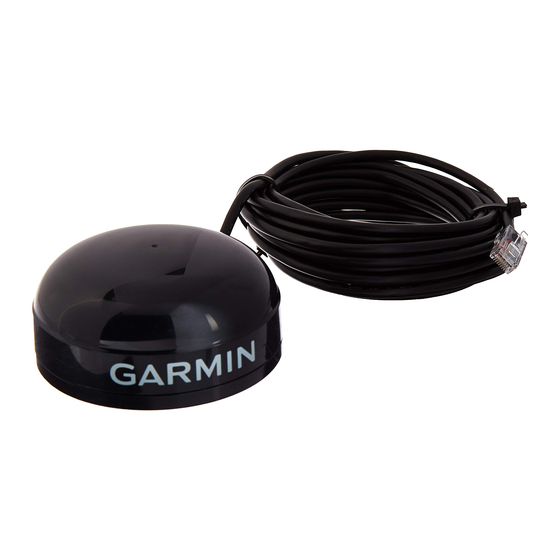Garmin GPS 16 Series Specyfikacja techniczna - Strona 7
Przeglądaj online lub pobierz pdf Specyfikacja techniczna dla Morski system GPS Garmin GPS 16 Series. Garmin GPS 16 Series 37 stron. Gps receiver / antenna
Również dla Garmin GPS 16 Series: Deklaracja zgodności (1 strony), Specyfikacja techniczna (40 strony), Skrócona instrukcja obsługi (16 strony)

1.4 Overview
The GPS 16/17 series products are complete GPS sensors including embedded receiver and antenna, designed for a
broad spectrum of OEM (Original Equipment Manufacture) system applications. Based on the proven technology
found in other Garmin 12-channel GPS receivers, the GPS 16/17 tracks up to 12 satellites at a time while providing
fast time-to-first-fix, one-second navigation updates, and low power consumption. This generation of GPS sensors
adds the capability of FAA Wide Area Augmentation System (WAAS) differential GPS. The GPS 16/17's far-
reaching capability meets the sensitivity requirements of land navigation as well as the dynamics requirements of
high-performance aircraft.
The GPS 16/17 design uses the latest technology and high-level circuit integration to achieve superior performance
while minimizing space and power requirements. All critical components of the system including the RF/IF receiver
hardware and the digital baseband are designed and manufactured by Garmin to ensure the quality and capability of
the GPS. The hardware capability combined with software intelligence makes the GPS 16/17 easy to integrate and
use.
The GPS 16/17 series products are designed to withstand rugged operating conditions and are waterproof to IEC
60529 IPX7, immersion in 1 meter of water for 30 minutes. These complete GPS receivers require minimal
additional components to be supplied by an OEM or system integrator. A minimum system must provide the GPS
with a source of power and a clear view of the GPS satellites. The system may communicate with the GPS via two
full-duplex communication channels. Internal FLASH memory allows the GPS to retain critical data such as satellite
orbital parameters, last-known position, date, and time. End user interfaces such as keyboards and displays are the
responsibility of the application designer.
1.5 Features
•
12-channel GPS receiver tracks and uses up to 12 satellites for fast, accurate positioning and low power
consumption.
•
Differential DGPS capability using real-time
accuracy (see Section
1.7 Technical
•
Compact, rugged design ideal for applications with minimal space.
•
May be remotely mounted in an out-of-the-way location.
•
Receiver position information can be displayed directly on a chartplotter or PC.
•
User initialization is not required. Once the unit is installed and has established a location fix, the unit
automatically produces navigation data.
•
User-configurable navigation mode (2-dimensional or 3-dimensional fix).
•
Highly accurate one-pulse-per-second (PPS) output for precise timing measurements. Pulse width is
configurable in 20 millisecond increments from 20 ms to 980 ms with 1 µs accuracy.
•
Configurable for binary format carrier phase data output on COM 1 port.
•
Flexible input voltage levels of 3.3 VDC to 6.0 VDC with over-voltage protection in the GPS 16LVS, and
8.0 VDC to 40 VDC in the GPS 16HVS and GPS 17HVS.
•
FLASH-based program and non-volatile memory. New software revisions available through Web site
download. Non-volatile memory does not require battery backup.
•
Waterproof design allows continuous exposure to the prevailing weather conditions at most locations.
•
GPS 17HVS can be flush mounted or pole mounted on the enclosed 1" marine mast mount.
190-00228-21
WAAS
or RTCM corrections yielding 3 to 5 meter position
Specifications).
GPS 16/17 Technical Specifications
Page 3
Rev. A
